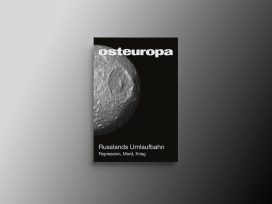War in the Caucasus
Did something happen? If one treats the level of public attention paid to an event as an indication of its significance, the only conclusion can be that we have already returned to business as usual. And anyone who saw the pictures of the Russia-EU summit that took place in Nice on 14 November 2008 will have rubbed their eyes in astonishment. What a pleasure it was to watch the little men from Moscow and Paris hugging each other and laughing. Medvedev and Sarkozy showed us: Realpolitik is a wonderful thing! It’s fun, it makes you successful! So it comes as no surprise that the EU’s negotiations with Russia about a new partnership and cooperation agreement, which were suspended after the war over South Ossetia in August 2008, have now been resumed. And after all, these negotiations were only “postponed”, as diplomats put it, never broken off. As a result it is easier to resume them and for the diplomatic caravan to move on. This is an iron law of politics and of the representatives of the media who follow the caravan around. Bustling on to the next item on the agenda in this way does not help us to reflect on what has happened. But it is sometimes a good idea to pause, look back, and draw up a balance sheet.
Did something happen? Yes, it did! The war between Georgia and Russia was the sixth war in the Caucasus since 1991, which makes this region the most conflict-ridden space, the one most likely to give rise to wars, in the neighourhood of the EU. This conflict was more than a “small”, “short”, or “local” war. All these adjectives have a euphemistic, anaesthetising effect. They divert our attention from the fact that every war causes death, traumatisation, and destruction, and drives people from their homes. In addition, this war serves as a cautionary tale in a number of respects.
– It is a mistake to read Clausewitz as a military thinker. His thought was eminently political: war is the continuation of politics by other means. And war reveals a good deal about the character of politics, the political order of the conflict parties, and the worldviews of the actors. This applies equally to Georgia and Russia.
– Regardless of all the military skirmishes and provocations that had gone before, it was the Georgian regime under President Mikheil Saakashvili that started the war in South Ossetia in summer 2008, with counterproductive consequences. The decisionmaking process that led to this, which was opaque, authoritarian, and characterised by seriously distorted perceptions, shows that there are functional deficits in Georgia’s political system which can no longer be ignored by the EU in its neighbourhood policy.
– Lev Gudkov, Boris Dubin, and Lilia Shevtsova have demonstrated repeatedly on the pages of this journal that since Putin came to power, Russia’s rulers have needed external enemy images in order to strengthen negative mobilisation, recentralisation, and legitimation of the authoritarian order, and also that they have been falling back on the Soviet motif of Russia as a fortress under siege. What is claimed to be a threat posed by NATO and the USA plays a fundamental role in this view of the world. A “small successful war” was functional, and the population of Russia did indeed close ranks behind the leadership.
– The political collateral damage was enormous. Russia’s military reaction in South Ossetia may have been legitimate, but with its advance into Georgia, occupation of parts of the country, and political actions the Kremlin has succeeded in turning a small-scale military success into a large-scale political defeat. The recognition of South Ossetia and Abkhazia as independent states does not offset the further militarisation of Russian society and politics and Russia’s self-isolation on the international stage, even within the CIS and the Shanghai Cooperation Organisation.
– This war was a catalyst. At one stroke the contradictions, tensions, and estrangement that had accumulated between Russia and the West since the beginning of the Putin era came into the open.
– The German public debate was hardly up to date. Talkshows on the two main public TV channels provided a litmus test. “Are we returning to the Cold War?”, the worried-looking moderators asked, and then the likes of Peter Scholl-Latour, of all people, were asked to provide an answer people whose view of the world was formed between the Berlin Blockade and the Cuba Crisis and has not changed since. A fiasco.
– Ah yes, the “Cold War”. People still cannot get it out of their heads. The conceptual apparatus available to politicans and the media is inadequate. The war in South Ossetia did not mean the return of “Russian imperialism”, and it is not the case that the USA is behind all the bad things that happen in the Caucasus. Sweeping assertions of this kind serve only one purpose: they appear to provide certainty in circumstances where we need a sceptical approach and careful examination of the facts. They are usually misleading. There are also some quite different categories which need to be examined more closely, for example the idea of a “strategic partnership” between Russia and the West. The repetition of the mantra that there is no alternative to close cooperation with Russia for reasons of energy policy loses its religious effect when one considers that oil and gas are finite resources and that there is a categorical imperative, dictated by the need to address climate change, to establish an economy that will be able to function after fossil fuels run out.
– The new frontlines after the war in the Caucasus are confused. Armenia will have to reorient its policies. Things are beginning to change in the conflict over Nagorno-Karabakh. All of this means that more attention than hitherto must be paid to the Southern Caucasus.
– One dimension of the war was completely ignored: its religious aspect. For the first time in over 100 years, since the war fought by Serbia, Bulgaria, and Greece for control of Macedonia, soldiers belonging to two Orthodox churches, those of Russia and Georgia, faced each other in battle. The power of these churches to oppose the warmongers on their own side in time of war, and to help bring about a peaceful solution, remains astonishingly limited. That is another question, though it is yet another sad aspect of this war.
It remains to be seen whether all the actors who performed this cautionary tale, in the Brechtian sense, are also prepared to learn from it. In this issue of Osteuropa , our contributors offer some possible ways of reading the story.
Manfred Sapper and Volker Weichsel
Published 5 December 2008
Original in German
First published by Osteuropa 11/2008
Contributed by Osteuropa © Osteuropa / Eurozine
PDF/PRINTNewsletter
Subscribe to know what’s worth thinking about.



